Amazing Grace
 by John Newton
by John Newton
Amazing grace! How sweet the sound that saved a wretch like me! I once was lost, but now am found; was blind, but now I see.
‘Twas grace that taught my heart to fear, and grace my fears relieved; how precious did that grace appear the hour I first believed.
Through many dangers, toils, and snares, I have already come; ‘tis grace hath brought me safe thus far, and grace will lead me home.
The Lord has promised good to me, his word my hope secures; he will my shield and portion be, as long as life endures.
Yea, when this flesh and heart shall fail, and mortal life shall cease, I shall possess, within the veil, a life of joy and peace.
When we’ve been there ten thousand years, bright shining as the sun, we’ve no less days to sing God’s praise than when we’d first begun.
PASTOR’S NOTE
Rev. Skitch Matson
The tune of Amazing Grace can be picked up by just about everyone, can’t it? Even those of us who wouldn’t expect ourselves to be part of a choir (or, run from the thought of singing in one) can pick it up. When those first few notes hit the organ, or the piano, or the guitar, (Buh bah! Ba-bo-ba!) every one of us—the regular churchgoers, the doubters, the happy, the sad, you and me—we are transformed into a choir of saints and sinners who sing to God those hope-filled words. We sing for faith, we sing to cry out, we sing for healing, we sing for hope. We sing for God’s grace to transform this mess of a world that we find ourselves in, and to transform us, who often feel like we’re a mess ourselves.
Throughout the verses we are naming God’s Grace coming to us before we can believe it to be true (Methodists like to call this Prevenient Grace); we name the ways we’ve messed up this gift of God’s love, and how, even still, God forgives us (this is Justifying Grace); and we name how God’s grace, over time, is transforming us from the inside out to be more like Jesus in all that we do (this is Sanctifying Grace). And just like that, whether we knew it or not, we’ve been gifted a theology lesson wrapped up in a song.
We Methodists like to do that. Rather than having shelves of books to read on our theology, the old adage for Methodist theology is: take a look at our hymns. While Charles Wesley may not have written this one, it was still common throughout America in the 18th and 19th centuries by Methodists trying to live faithful lives in the midst of the mess the world was in at that time. From enslaved people singing the final verse (When we’ve been there ten thousand years…) to bring hope amidst the sinful injustices perpetuated against them, to Native Cherokee peoples doing the same thing while walking the Trail of Tears, this song has been a balm for so many during their lowest of lows, a steady anchor when things are out of our control.
(continuedonpagethree)
THE HISTORY AND LEGACY OF AMAZINGGRACE
Amazinggrace,howsweetthesound…
Mikaela Langdon
It’s one of the most popular and recognizable hymns of all time; the text has been set to over 20 melodies and recorded thousands of times. The song “Amazing Grace” is many things to many people. It’s just as likely to be linked to freedom and salvation for some as the rise of Christian nationalism for others. The history of the song, and the man who wrote it, is in many ways as nuanced and complicated as the legacy that lives on. …thatsavedawretchlikeme.
On the surface, it’s an inspiring story: a man involved in the Atlantic slave trade almost died in a horrible storm, resulting in his conversion to Christianity and eventual work in the abolition movement. While this is all true, it’s an oversimplification of John Newton’s life. After all, humans rarely fit into convenient anecdotes. In reality, Newton’s conversion wasn’t immediate. His brush with death occurred during a violent storm at sea in 1748 when he desperately cried out for God to save him. His survival did lead to his conversion to Christianity but he continued to be an active part in the kidnapping and enslavement of African people for six or seven years after that.
Ioncewaslostbutnowamfound…
It wasn’t until 1773 that Newton, who went on to become an ordained curate, wrote “Amazing Grace” with poet William Cowper to illustrate a sermon. Newton didn’t publicly condemn slavery until 1788 in his pamphlet Thoughts Upon the Slave Trade, after which he became an ally in the effort to abolish slavery in Britain. While in some ways his story reads like an epic poem, the song he wrote outgrew him. That is often the way of art, after all.
…WasblindbutnowIsee.
“Amazing Grace” debuted on paper in Newton and Cowper’s Olney Hymns in 1779. While it found minor success in Britain, it was a bigger hit in America, particularly among Christian evangelists. It was an American composer, William Walker, who in 1835 set the song to the melody we most commonly sing today, referred to as the “New Britain” version. Since then, the song has been deeply intertwined with American history. Westward settlers and Civil War soldiers both took comfort in the lyrics that promised hope amidst suffering. The hymn was translated into the Cherokee language by Samuel Worcester and was sung by Cherokee people on the Trail of Tears. It was part of civil rights marches, war protests, and even Woodstock in 1969. It is undeniable that “Amazing Grace” is woven through the fabric of the American story and has been deeply personal to a wide variety of people.
Even before I started attending Children’s Service/Sunday School, I would frequently hear my grandma hum or sing Amazing Grace. At the time, the words did not mean much to me. It was the associated emotions my grandma expressed as she sang that always caught my attention. When I was old enough to attend Children’s Service/Sunday School where we learned the song, it all made sense to me. My grandma had no formal education, property, or worldly fortune, but she led a very full life, rich in spirit – and it was only but for that Amazing Grace she would beautifully sing about.
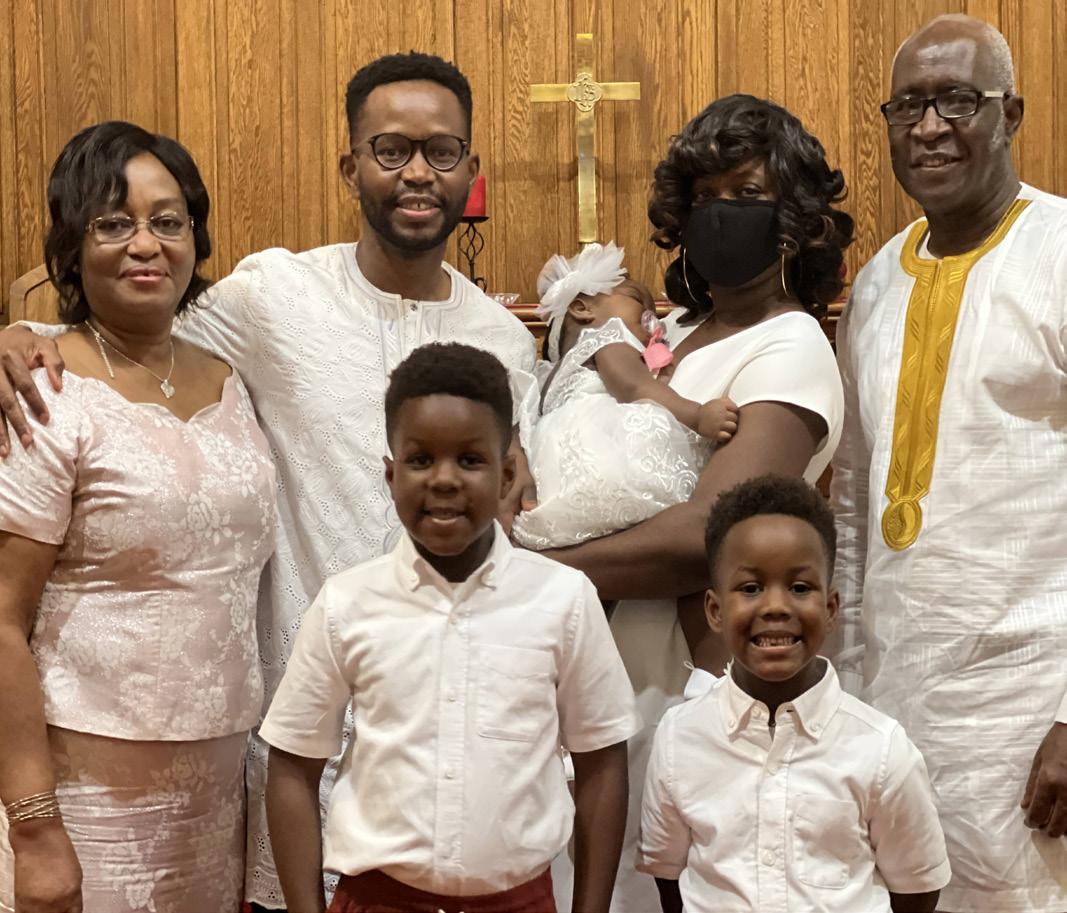 -Raphael Aryeetey
-Raphael Aryeetey
2 3
Right: John Newton, in his later years.
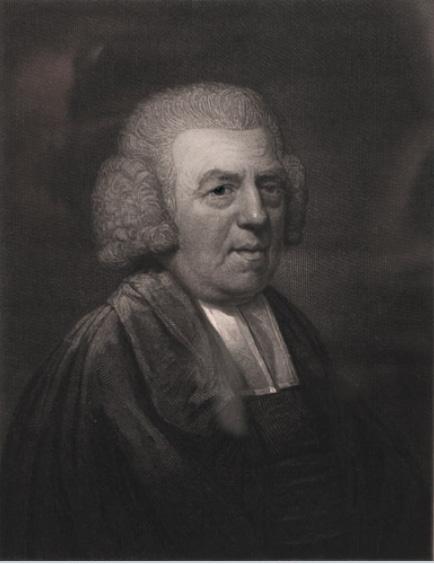
Perhaps the greatest lesson of “Amazing Grace” is in the power of art and legacy. John Newton died in 1807 but over 200 years later, his words are instantly recognizable all over the world. A man complicit in one of the greatest atrocities of human history wrote lyrics that brought comfort to the desperate and oppressed for centuries. There is grace in that fact alone. We are all more than what we’ve done but we are, in many ways, what we leave behind. May we all leave behind love and grace that reverberates generations beyond us.
Whenwe’vebeenheretenthousandyears Bright,shiningasthesun We’venolessdaystosingGod’spraise Thanwhenwefirstbegun
Source: “Amazing Grace” Wikipedia page, references can be found here.
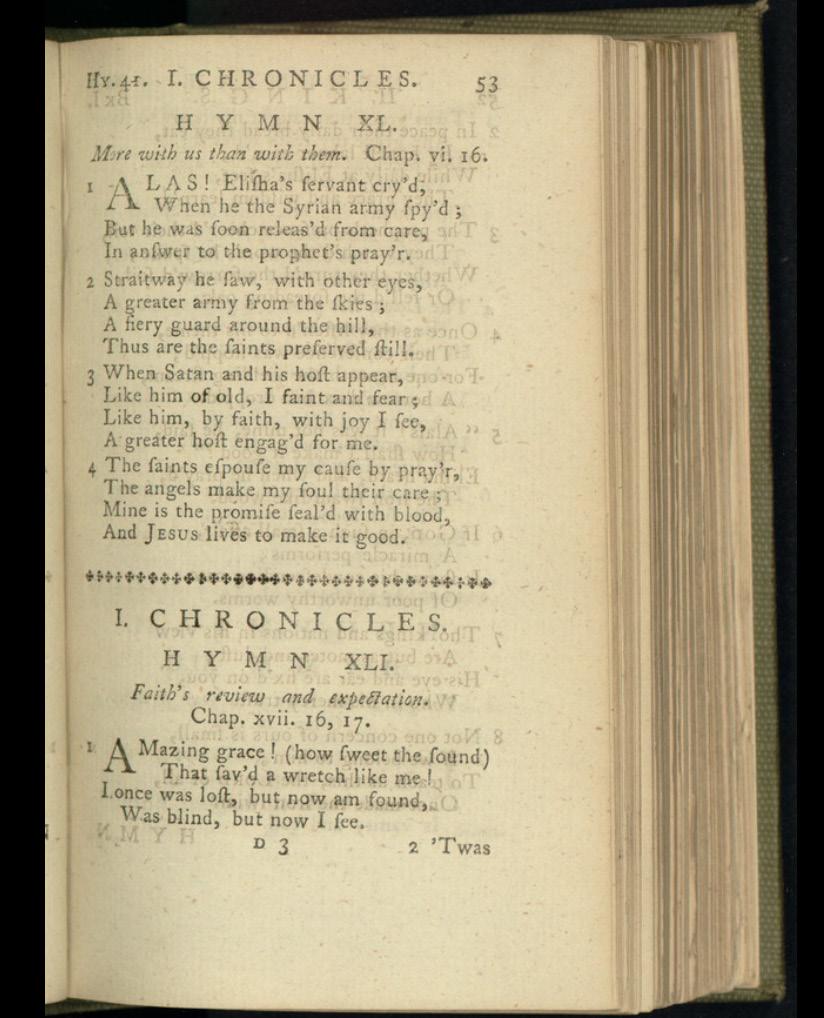 Rev. Skitch Matson
Rev. Skitch Matson
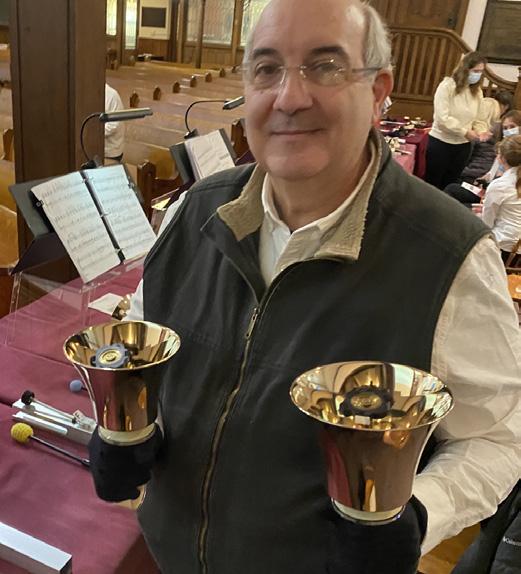

{Continued from page one}
Throughout the season between Easter and Pentecost, we are focusing on the verses of Amazing Grace to walk through just how God’s grace works in us, how it transforms us, and how it leads us to change the world. It’s foolish. It’s powerful. It’s hopeful. It points to resurrection when others only see death. It has the power to change the hardest of hearts (read John Newton’s bio), and it has the power to transform relationships.
Each and every day we wake up to a world that is in a mess. And each and every day we try our best to make a positive impact on the world, to live out our faith in ways that bring justice, liberation, freedom, Sabbath, and peace, as well as trying to eradicate injustice, bondage, anxiety, loneliness, and shame. Rather than assuming we are the ones to do all of this work, maybe we can rely more on God’s amazing grace to work in us, freeing us to participate in what God is already doing in the world. Freeing us to give that grace to others because we have first received it.
Maybe it starts with listening to a different version of Amazing Grace each week, finding new versions from communities we’re not as familiar with. Say, like the version that is sung in Twi (a language of Ghana), or one of the many live versions from Aretha Franklin, or learning the ASL movements to sign it.
God’s amazing grace is here for you this season and every season. Will you let it transform your own life? I hope so. The messy world hopes so, too.
On the Journey With You, Pastor
Skitch
Left: Page 53 of Olney Hymns showing the first stanza of the hymn beginning with “Amazing Grace!”
I think...when we experience God’s Grace through music, that must be God’s gift.
-Antonio Merolli
LAITY SPOTLIGHT: IONA HARDING
 Kate Lasko
Kate Lasko
Come to walk the Labyrinth during Holy Week, chances are Iona Harding is there to help. Come to the office during newsletter prep, chances are Iona Harding is there stuffing envelopes. Come to services on any given Sunday, chances are Iona Harding is there reading the liturgy or warmly greeting her Princeton UMC family. For this past year Iona has also served PUMC as a member of the Central District Multi-Site Ministry (CDMSM) Design Team and as Chair of the Leadership Board.
Last year, Pastor Jenny asked Iona to join the team which consists of clergy and lay representatives from Princeton, Kingston, Hopewell, Penningon, and Titusville. As envisioned by then-District Superintendent Hector Burgos, under Pastor Jenny the team would “consider and discern creating something new and exciting, something that would join into one, various UMC campuses in our geographic area,” explains Iona. In addition to sharing resources, systems, and programs, the CDMSM would “grow all of the churches in number, financial health, discipleship and impact,” she adds. To date, PUMC has partnered closely with Kingston UMC, sharing many resources and programs. Hopewell and Titusville UMCs remain in the CDMSM discussion. For Iona, the work of the Design Team “is guided by listening for and aligning ourselves with God’s direction and purpose.”
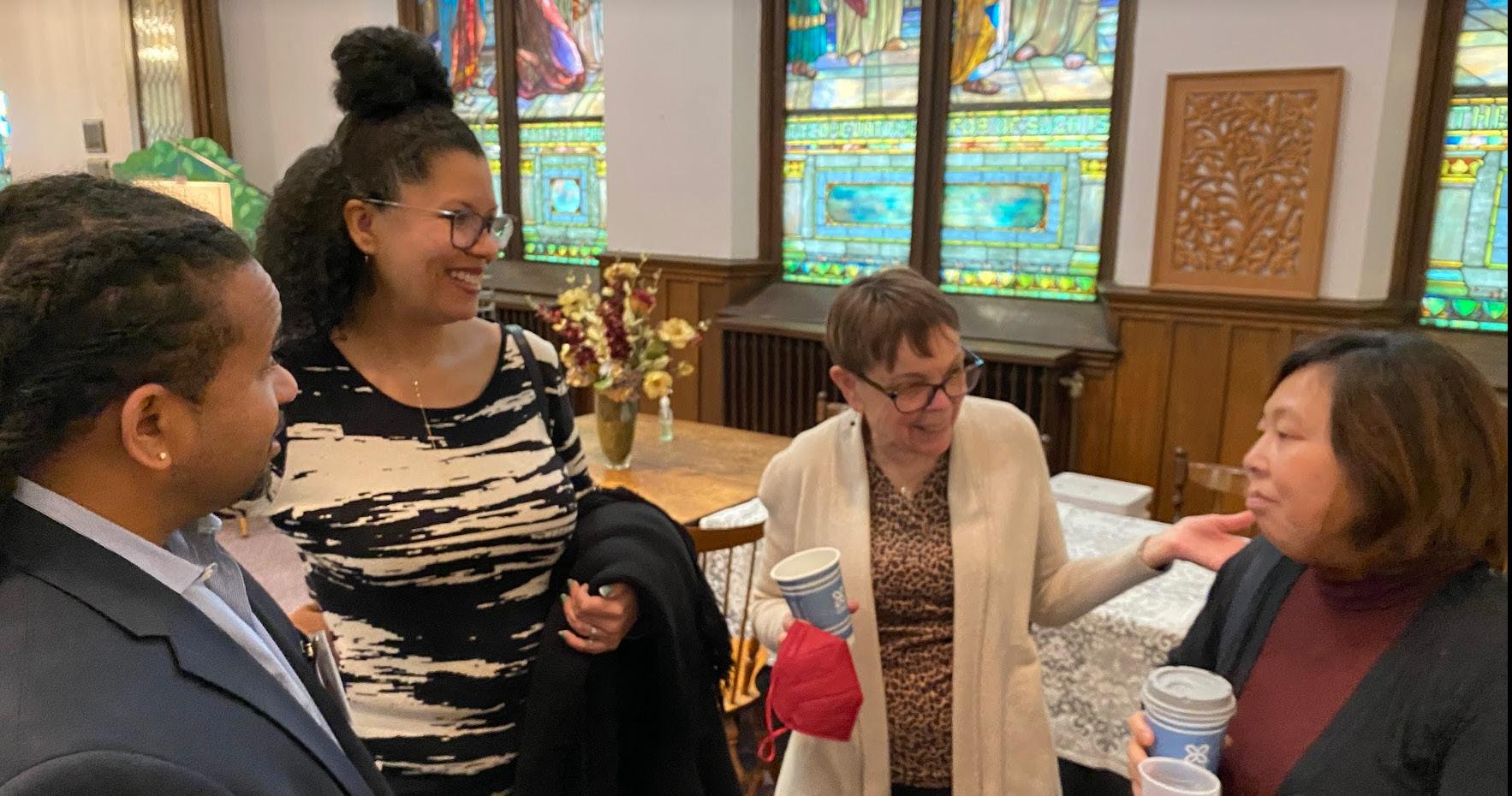 Iona Harding, Chair of Leadership Board and Multi-Site Ministry Design Team
Iona Harding, Chair of Leadership Board and Multi-Site Ministry Design Team
While the CDMSM Design Team looks to do more with many, PUMC’s Leadership Board is designed to do more with fewer meetings, better decision making and better communications. “We aim to involve more people in ministry and outreach without having to be on committees; getting people to serve on committees has been a big challenge,” Iona explains. The creation of this new board resulted from discussions last year on how to streamline the existing leadership structure to maximize lay participation by focusing on specific tasks and ministries. The Leadership Board has nine members with Pastor Jenny in a non-voting role and brings under one umbrella the Finance, Endowment, Trustee, and Staff-Parish Relations Committees. “We now function as one, making church business decisions together” clarifies Iona. Under the new board structure, lay involvement no longer requires serving on so many committees and attending numerous meetings. Previously, PUMC had so many committees that it took more than 100 people to fill all the slots. “Now you can share your skills and talents, learn new skills, meet and have fun with people on short-term projects that don’t require endless meetings,” explains Iona, adding, “I hope everyone who reads this will be excited to learn more and ask to join a task force!” (The ninemember Discipleship Board accompanies the Leadership Board in the planning of ministries and outreach.)
Iona, pictured center right, encourages all to consider joining a task force as new short-term projects will soon come to fruition through the initial planning of the Leadership and Discipleship boards.
4 5
Since much of Iona’s professional life has been in planning and human resources, it is no surprise that much of her volunteer work over the years has drawn on those skills. When she joined PUMC 20+ years ago, she had a busy career in financial planning and human resources, first at AT&T and later at Lucent Technologies, ending her career with them in Beijing as interim H.R. Executive for Lucent China. Though she retired in 2005, she has been “doing her own thing as an H.R. and organization consultant for the past 18 years,” she says. More often than not, she donates her time and skills to service organizations in the area,sitting on the Board of the Princeton Senior Resource Center, and on the Finance and Administration Committee for the GNJUMC. She is also a Commissioner for the Human Resources Standards Institute.
As a life-long Methodist, Iona lives the promise she made at her confirmation: “to share my gifts and to give of my time and service.” But for Iona, service is more than a responsibility to be fulfilled. Service draws her closer to God. It is where she experiences joy and where she finds grace. “I find grace in the faith that is shared among the Leadership Board. I find grace through worship, and I find grace through working, sharing, and having fun together with the amazing people at [church],” she says.Simply put: “I find grace in the family that is PUMC.”
STAFF SPOTLIGHT: TOM SHELTON
Tom, pictured far left, directs the PUMC Children’s and Youth Choirs with grace.
For the nine years that Tom Shelton has been at Princeton UMC, he has helped children and youth absorb the messages of Christ through words and melodies – including some he wrote himself. Perhaps even more important, Tom has modeled how to show grace and compassion. What is his definition of grace and what helps him find it?
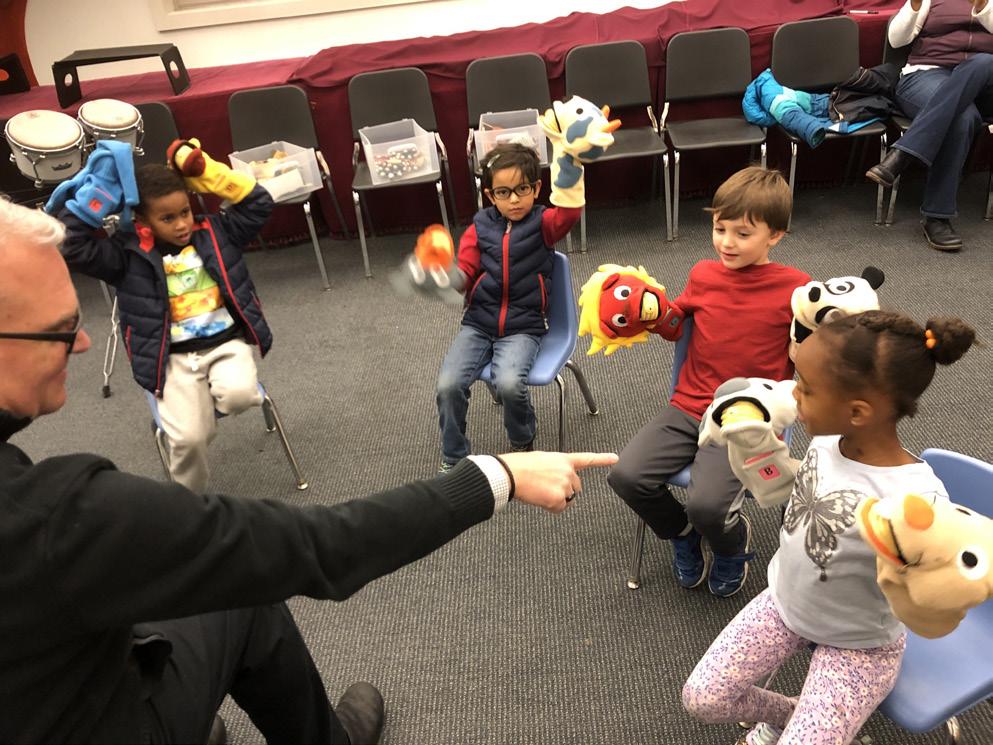
“God’s grace is everywhere, and it manifests itself in different ways,” says Tom. “I don’t want to relate it to good deeds, because it’s not. It’s the way you spread kindness, the way you treat someone on the street, the way you follow the teachings of Jesus.”
Tom says he and his four sisters learned about grace from their mother, “the most grace-ious person I have ever met in my life. I get my positive spirit from her,” says Tom. “She is the best mother in the world.”
Then, in 18 years teaching in a North Carolina middle school, Tom had plenty of practice dealing with roiling hormones and teenage angst. “You can’t believe what happens in the three minutes when classes change,” says Tom. “I would stand at the door and smile at every student because I might be the only person that smiled at them that day. I gave them a chance to start over. To teach them how we are all different and can get along. We don’t have to agree, but we respect each other.”
Now, navigating today’s divided world, he tries to keep in mind that everyone is under stress. “Compassion is a really beautiful thing. I try to remember that their actions are not a reaction toward me. It is what they are dealing with. I personally try to give them grace to deal with that situation.”
Beyond his faculty roles at Rider University and the Princeton Girl Choir, Tom’s impressive resume includes being past president of the American Choral Directors Association, conducting choir festivals and honor choirs in Carnegie Hall, 20 states and some foreign countries, and publishing 70 of his own compositions. Yet when we see Tom, he is playing games with little kids or taking eight high school girls through their vocal exercises. How does grace play a part in this work at Princeton UMC? (continuedonpageseven)
GRACE THE CAT
Barbara Fox
I named my rescue cat “Grace” because I thought she could remind me to always keep God’s grace at the top of my mind. When I heard that the sermon series would be focused on grace (as a theological concept) and grace (as in the hymn Amazing Grace) I tried to make some comparisons using Psalm 139.
The psalm writer begins by admitting that God knows his intimate thoughts: You have searched me and known me. You know when I sit down and when I rise up. You discern my thoughts from far away. (Grace the Cat, if I even THINK about taking you to the vet, you run so I can’t find you.)
You search out my path and my lying down. (Grace the Cat: When YOU want to go to bed, you search me out and tell ME to lie down.)
And are acquainted with all my ways. (Grace the Cat: If I start to empty the wastebaskets, you know the cleaning lady is coming and hide).
Even before a word is on my tongue, O Lord, you know it completely. (Grace the Cat: When I am sad or upset, you make a special point to stay with me, to sit on me and purr.)
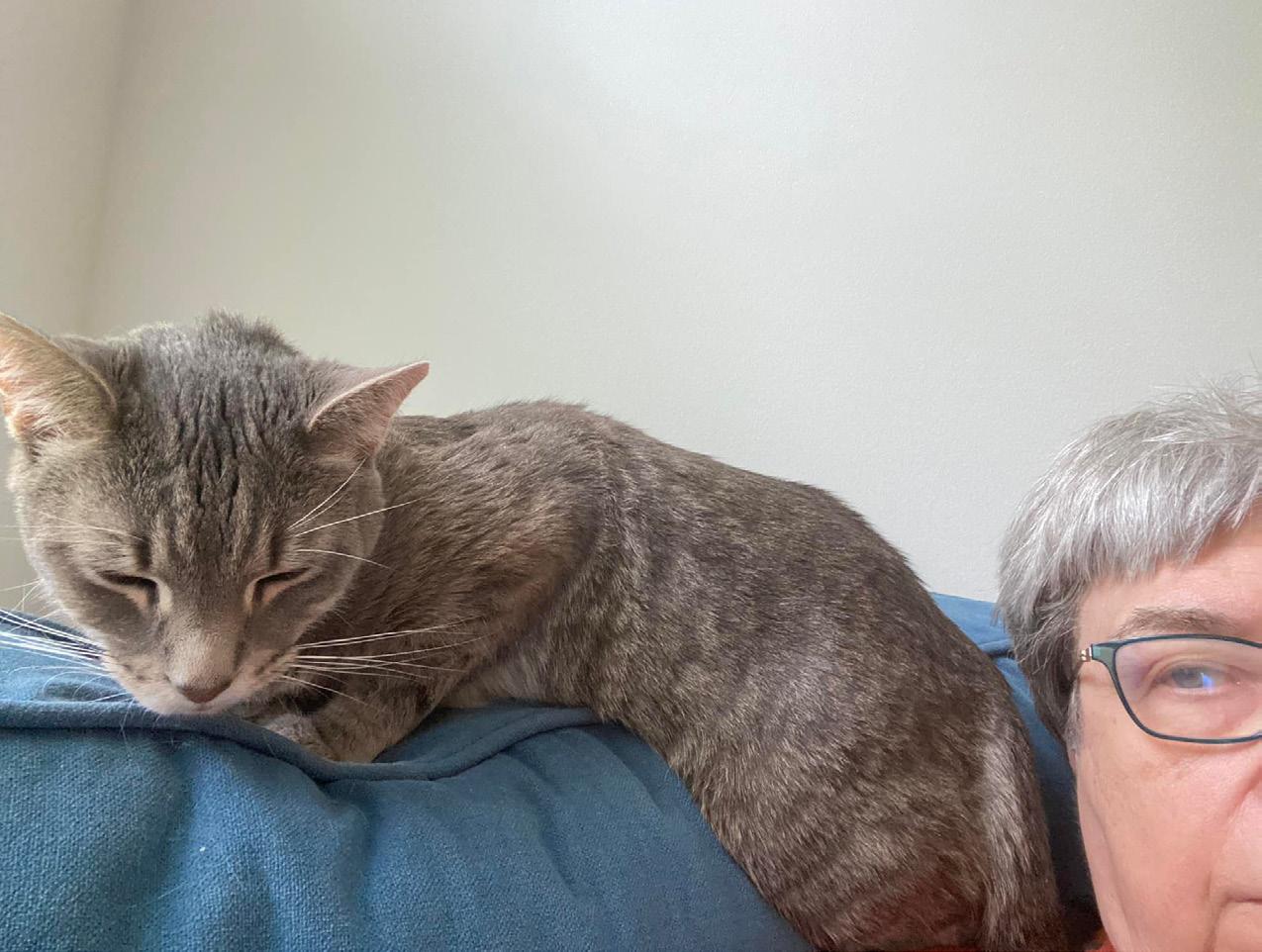
You hem me in, behind and before. (Grace the Cat: If I lie on my right side, you snuggle on the left, so I can’t turn over.) And lay your hand upon me. (You like to put your paw on my face, which seems sweet when you have just had your nails clipped.) Such knowledge is too wonderful for me; it is so high that I cannot attain it (You are spontaneous. I can never figure out what you are going to do next.)
Where can I go from your spirit, or where can I flee from your presence? If I ascend to heaven, you are there. If I make my bed in Sheol you are there. (If I sit on the sofa, she is there. If I lie on my bed, she is there. She bumps her nose against my cheek.)
Grace the Cat, nevertheless, needs me to offer grace to HER. If she takes the wings of the morning and settles at the farthest limits of the sea (if she hides from me when I need to help), even there my hands shall lead her, and my right hand shall hold her fast.
Surely the darkness shall cover me, and the light around me becomes night. Even the darkness is not dark to Grace the Cat, for darkness is as light to her.
I praise God, for she is fearfully and wonderfully made. Grace the Cat is indeed wonderfully made. To take just one example – her whiskers are a delicate and elegant navigation system.
Unlike God, Grace the cat is anxious, exceptionally anxious. Her previous owner must have abused her. SHE would say the penultimate verse of this psalm: Oh that you would kill the wicked, O God, and that the blood thirsty would depart from me.
The psalm concludes with an invitation: Search me, O God, and know my heart; test me, and know my thoughts. See if there is any wicked way in me. Grace the Cat is helping me find God’s grace, so that God can lead me in the way everlasting.
May we all find grace in amazing ways.
6 7
He explains the contrast between the podium at Carnegie Hall and the games with youngsters in green choir robes: “With every situation your expectations are different. The people before you have different backgrounds and in what they are bringing musically. I love the Pre-K group. They love games, singing, everything. The 2nd-5th grade group also have a love for what they are doing, even though sometimes they don’t act like they do. And this youth choir, with only eight people, sings better than any group I have ever had.”
Surely that’s because they’ve been coming to choir practice all their lives? Yes, he’s known some since kindergarten. “You know who they are, you are not starting over. It’s a trust factor. The best choir is where everybody feels confident to sing by themselves. They can sing in four parts and are very brave.”
One favorite ‘grace’ opportunity here is that he can write music for these singers. During Covid, he wrote and produced “I See God” for 15 children, ages four through eleven, using their words to create songs about prayer, baptism, and the beatitudes. “I took all their ideas and put them into where they see God.” Tom is also especially grateful for the diversity of the PUMC community. “I grew up in the South. I love that our church is truly a melting pot – it makes me so happy.”
How will grace infuse his life in the future?
“I think music is a gift from God,” says Tom. “When you are a musician, and it’s what you choose to do with your life, you have an emotional connection to the lyrics you sing. No matter how old you are, make sure there is something in your life to connect to that song – or it’s just words, and the message that comes across is totally different.”
He tells about a third-grade class in North Carolina that was so rambunctious he had to be very strict. But one day when he had them sing a really pretty little song, one girl ended up sobbing. It reminded her of her grandfather who had just died. Then a little boy started crying about his dog that had passed away. Then a third person cried. “The teacher asked, ‘What have you done to my class?’ That’s when I realized that even young kids can connect text and music to life’s experiences, and it makes a difference in their lives.”
Music is so important to Christian Formation, he says. “What you are teaching – stories, love, about Jesus – they will remember for the rest of their lives. They will remember scriptures, but they will REALLY remember songs.
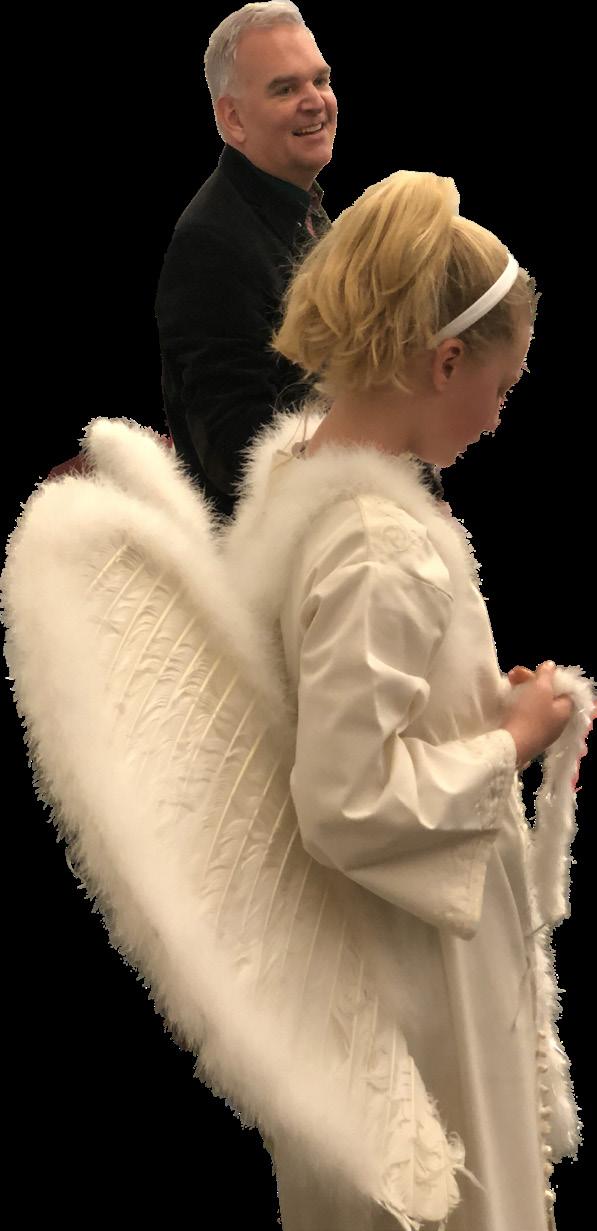
See the fruits of Tom’s grace-ious leadership on May 14th at PUMC’s Children’s Musical, “Called.”

One of the reasons why I love music is seeing how happy it makes people. Having people come up to me after the service and them telling me how happy my music made them makes me the happiest! All the practice I put in makes it all worth it.
I think that is how I feel god’s grace.
Leanne
Singing in church is fun because I like to practice different things!
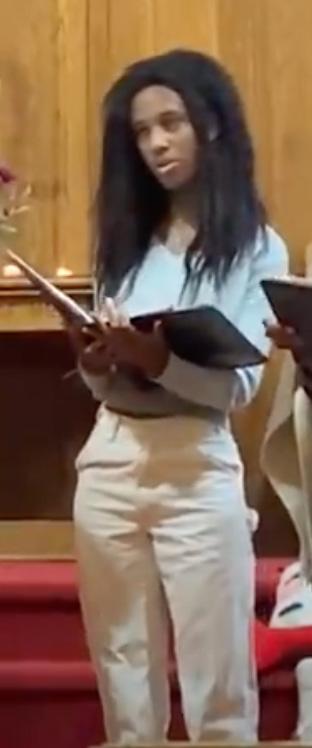
-
Raphael Aryeetey,
Jr.

I like playing instruments and singing solos! I like the songs we sing a lot. And the Christmas pageant.
- Andrew Aryeetey
(continuedfrompagefive)
-
Griffiths
SHE IS WHO SHE IS: THE MINISTRY OF LULA CRAWFORD
“I feel like – I am who I am,” says Lula Crawford. For 16 years she used her many talents as a designer, business woman, and counselor to help Princeton UMC make disciples for Christ. Last year she moved to a new development near Hilton Head, North Carolina, and spoke about her concept of “grace” in a phone chat.
Lula says her mother, whom she describes as having a “strong will and independent mind,” helped give her confidence. “When I left my parents’ home in South Carolina, I took a job in Delaware knowing no family or friends and never thought I was doing the wrong thing.” It was God’s grace, she says, that nourished her determination to seek whatever she wanted or needed.
Lula talks about how, when we are in God’s grace, we experience delight. The delight is compounded, she says, when we can share, with others, our experience, or our knowledge, or the gifts that God gave us: “I found joy in sharing in expressing beauty and creating comfort for others!”
At PUMC she drew on her experience with her business, Elegant Windows and Doors by Lula, to serve on the Board of Trustees and make the building more hospitable. “Ida (Cahill) and I started with the downstairs bathrooms near the Fellowship Hall. They were in terrible condition.” She sourced a contractor who was “so impressive with what he did with those bathrooms” that he was chosen for other jobs at the church. “It’s the human being behind the business that matters. That is what makes small businesses successful. You have to have the human touch.”
“It gave me and Ida joy to know that we were improving the area for others to use.” Working with Ida on new carpeting, she located the company that specializes in jobs for churches. Then the kitchenette, cramped and inefficient, needed an upgrade. After they moved the sink and added cabinets, it’s an efficient place to serve refreshments. She also used her design talents for the parsonage. During Covid, Ida and Lula enhanced the dingy parking lot entrance so it offers an inviting bench with cushions and pillows.
Her long wished-for pew cushions finally came, but only after she had moved. “I had been pushing for pew cushions for quite a while.”
Lula grew up in South Carolina and graduated from Claflin University (the state’s first college to admit students of any race). Though she and her husband had two sons, Mark and Byron, she kept on working, except for the year when Byron was born. That year she took a class in “Sewing for the Home” (she had always made her own clothes). It unleashed her creativity, and she opened her business. Now divorced, she has five grandchildren, located in Montclair and Seattle. And – being Lula – she volunteered to use her personal experience to help others. She facilitated the Divorce Small Group for years.
Lula Crawford (left) at her new home, visited by her friend Iona Harding. She leaves good friends behind.
Iona Harding and Lula met in 1989 at Montgomery UMC and, years later, came to Princeton UMC.

“In church, we can form lifelong friendships,” says Iona.
“I feel absolutely blessed that Lula and I became good friends and confidants” says Ida Cahill.
“We laugh and cry together and continue to speak at least once a week. Whenever I hear the word joyful, I smile and think of Lula.
8 9
Lula has not yet decided what will be her church home, but she has found grace and joy as she looks to her future at Hilton Head. She moved there from Monroe Village because she had spent several happy vacations there. Her house is on a just-built street, so everyone is a newcomer. “I have a little sun room that goes out to the patio that backs up to some woods. With my coffee, I sit in my chair, and it’s so comfortable and peaceful. The move brought something -- the grace and mercy that God has given me – that I didn’t know existed.”
Lula also has the focus that comes with determination. Another word for that is gumption. “Some people thought I was crazy to move from Monroe Village to Hilton Head and maybe I was a little crazy. It was a big job. But I am OK. I am who I am.”
Her address: 818 Destiny Dr., Bluffton, SC 29909.

RETHINKING LYRICS IN AMAZINGGRACE
Amazing Grace is a well-known and beautiful hymn from the 1770s. Many of us can quote the lyrics to it. However, not all of us have the same reaction to the lyrics. Many disabled people hesitate to sing the line, “I was blind but now I see.” Why? First and foremost, it communicates that having sight is superior to being blind, which is eugenics. Eugenics was used to justify genocide during the early 20th century. Or one could see the above lyric as spiritual blindness, which still equates blindness as inferior to sight. Furthermore, if one sees it as spiritual blindness it may motivate them to try and heal blind people. Blind people bear the image of God as they are and do not need healing imposed on them.
When Amazing Grace was written, it was not uncommon to use disability as a metaphor like the one above. Disability being used as a metaphor still exists to this day, using words like “crazy, insane, blind, deaf, lame” etc. to describe something is an example. There are several problems with this metaphorical language. These words were used to institutionalize, kill, and further harm disabled people for centuries. Using these words metaphorically is ableist language.
A lot of people do not know the history behind these ableist words. Now that we know some of the history behind the language, we can change it to be more inclusive.
Here these words from Disability Theologian Stephanie Tait about how she feels about the line and her suggestion to change it:
“A polite heads up that there are a lot of ableist metaphors used in worship songs/hymns. The most common tend to use blindness as a representation of ignorance, sin, aimlessness, hopelessness etc and gaining sight as a marker of wisdom, wholeness, faith, and being “saved.”
If you’re abled (meaning if you are nondisabled), you may feel like that’s being “nitpicky” or “just looking for something to complain about.” But when you’re disabled, you hear *yourself* being used as a metaphor for everything we’re hoping not to be, and everything we’re saying Jesus came to correct and undo.
I’ve seen some progressive churches/conferences change lyrics to songs to remove harmful theologies or to be more gender inclusive. I’ve never seen one change a lyric to remove ableism though. Whenever I sing [Amazing Grace], I change the ableist lyrics “was blind but now I see” to “was bound but now I’m free.” Communicates the same message but without using anyone’s disability as a way to communicate being ignorant, broken, or less than whole.”
Her suggestion of changing the language to “was bound but now I’m free” is not the only option. Personally, when I sing Amazing Grace, I omit the line altogether. I think Stephanie Tait is on the right track with her critique of ableist language in hymns and songs. Changing ableist lyrics would go a long way in making disabled people feel more welcome in church spaces.
Elyse Horn
As a child, when I sat next to my mother in church, I noticed she did not join in the prayer of confession: “There is nothing good in me, O Lord, have mercy upon me, a miserable sinner.” When I asked why, she said she considered herself to be a good person who had not committed a terrible sin. Repenting, to her and to many of us, implies being judged, and why should we be scolded when we haven’t done anything really bad?
She would have been glad to read As If the Heart Mattered: A Wesleyan Spirituality by Gregory F. Clapper, the book on which our “Amazing Grace” sermon series is based. Clapper uses hymn verses, Bible stories, and popular references to explain that “if you want to know what a person truly is, you have to find out what they love, what they hate, what they take joy in, what they fear, and in what they find peace. . . If Christianity does not affect a person on this most elemental level, then it has not really taken root.”
John Wesley’s “religion of the heart” does not involve being scolded for our sins, “as though God were a parent who is always telling us to ‘Stand up straight’ when we would rather slouch,” writes Clapper. In contrast, “Repentance is an understanding that does not crush the human spirit, but instead gives us new life in surprising and powerful ways.”
To gain new life, in the Wesleyan tradition, we need to know ourselves. “Wesley’s use of self-knowledge offers insight into the human heart: we do not truly know who we are until we confess our sinfulness.” The author quotes Bob Dylan to illustrate the idea of repentance as selfknowledge. In “When He Returns” on the album Slow Train Coming, Dylan sings, How long can you falsify and deny what is real? How long can you hate yourself for the weakness you conceal?
“When we are completely honest with ourselves,” writes Clapper, “we cannot help but know that we are not holy, and it is liberating to speak this truth. . .When we repent, instead of denying ourselves, we name the truth of who we are.”
In another chapter, the author uses the character of Valjean in the novel and the musical “Les Miserables” to show “how forgiveness of our sins can lead us to a life of love.”
I’m looking forward to reading and rereading this book to get a better understanding of how Wesley’s “religion of the heart” can help me find more opportunities to understand God’s grace. It’s short, just 111 pages, including a glossary of often misunderstood terms like “holiness,” “works of piety,” and “orthodoxy.”
It’s well organized. After explaining why anyone should care about a “Wesleyan spirituality,” Clapper explains the “architecture” of a metaphorical House of Religion: The Porch of Repentance, the Door of Faith, the House of Holiness, and Living a Heart Religion in the World Today.
As If the Heart Mattered: A Wesleyan Spirituality, by Gregory F. Clapper. Paperback available on Amazon for $20, $8 used, or $9 on Kindle.

Barbara Fox ASIFTHEHEARTMATTERED
10 11
Pictured Above: From Princeton UMC member and former pastor Kathy Burt, “I’ve seen Wesley’s House illustration most often called ‘House of Salvation’ or ‘House of Grace.’ Clapper’s term ‘House of Religion’ is new to me. With this ‘House’ illustration I am trying to get away from the very common, very confusing term “preventing” often heard in presentations of ‘grace.’ I find the house illustration more clear. It is not perfect but hopefully it is clear.”
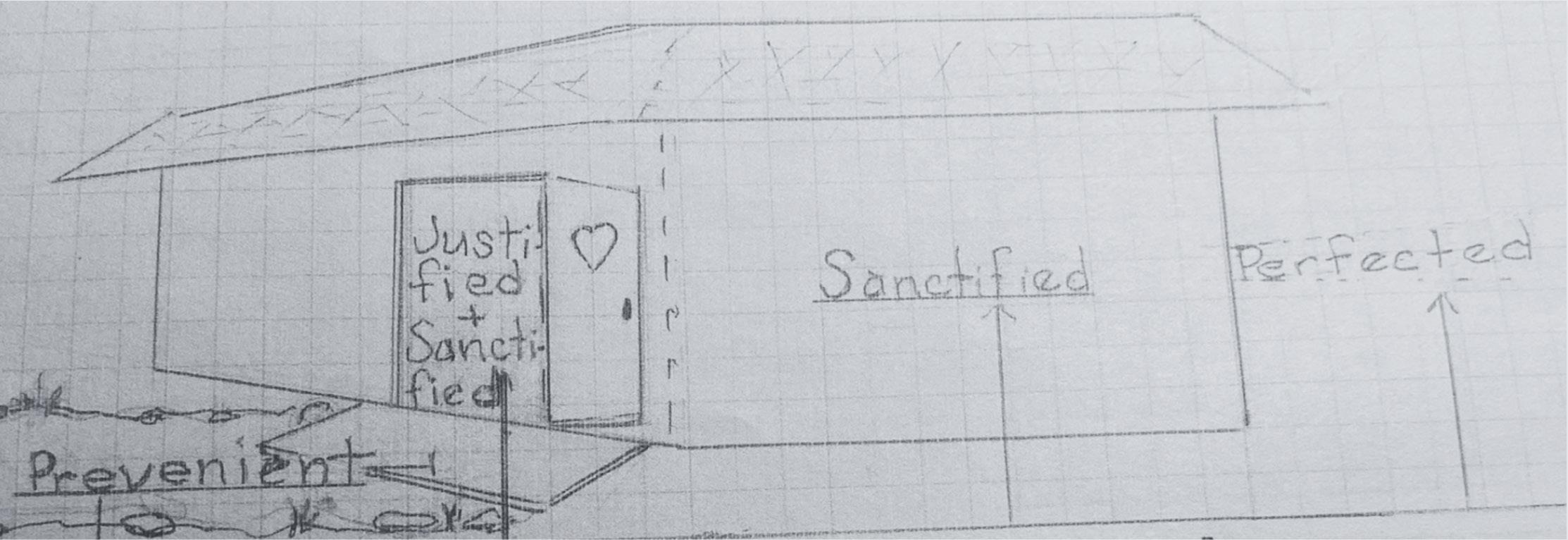
Sources:
John Wesley’s Sermons, An Anthology by Outler/Heitzenrater. Abingdon, Nashville.
The Story of American Methodism by Frederick A Norwood. Abingdon, Nashville.
You are encouraged to take an “Amazing Grace” slip or two from the church pew each week to take home and record your grace experiences this week.
Put them in a jar to create your own little space for grace at home!

PRINCETON UMC CORNER
Pew Cushion Update
In 2021, a suggestion was made to the Princeton UMC former Board of Trustees to purchase pew cushions for the main floor pews in the PUMC Sanctuary. Trustee Lula Crawford spearheaded the initiative, requesting estimates and fabric samples for the Board to examine. Trustees were on board with this initiative, but were adamant that no General Church Funds be used to purchase them. The Board decided to extend an invitation to the congregation to donate cushions in honor or memory of loved ones. If enough donations were collected, the Board would move ahead with the project. The congregation came through and members have now covered 85% of the cost of the cushions. There are some unrestricted funds available in one of the memorial accounts that can be used to cover the rest of the cost. If, however, you are still interested in making a contribution in any amount, those memorial funds could be happily reserved for future projects.

Please email Lori Pantaleo at loripantaleo@gmail.com if you would like to contribute any amount. Checks should be made out to PUMC with “pew cushion donation” in the memo line.
Thank you to these pew cushion donors...
Larry Apperson, John, Sharon, Sydney, Alex and Izzy DiStase
...In memory of Louise Apperson... surely she is smiling!
Jenny Smith Walz and Bobby Walz
Iona Harding
...In honor of Lula Crawford
...In memory of Edith Woodruff
Ichen Mei and Weichi Chen
...In honor of Ichen’s brother, Chung Mei
...In memory of Weichi’s beloved mother, Yunio Lin
Ed Sproles
Lori Pantaleo
...In memory of all the PUMC saints who we love and miss
...In honor of my wonderful parents
Karen Zumbrunn
...To the glory of God
...In honor of & with appreciation of Lori Pantaleo
...To the glory of God and in honor of Pam Nugent (updated)
Emelia Timpo
...In memory of Dr. Albert Timpo
Bequeathed by Edward and Isabella Dougan, 2022.
...LORD, we pray that all who seek you in this place may find you!
Given by Francis and Diane Wolf and family
...In memory of Cornelia B. Coopwood, given by Francis and Diane Wolf
Lou Davelman
Ida Cahill
Lori Pantaleo
12 13
CERTIFICATE OF INCORPORATION OF THE METHODIST EPISCOPAL CHURCH
The pictured certificate reads:
Princeton Methodist Episcopal Church
To the Clerk of the Common Pleus Court of Mercer Court
Whereas the religious society and congregation of the Methodist Episcopal Church usually meeting for public worship at Princeton in the township of Princeton, County of Mercer and State of New Jersey, did assemble at this said place of meeting on the twenty fifth day of May, A.D. 1859, ten days previous notice of the time and purpose of assembling having been given by an advertisement as upon open ____ at such place of meeting; and when so assembled did by plurality of voices of such of the said society and congregation as ___ present elect seven of the said society and congregation to be Trustees of the same.
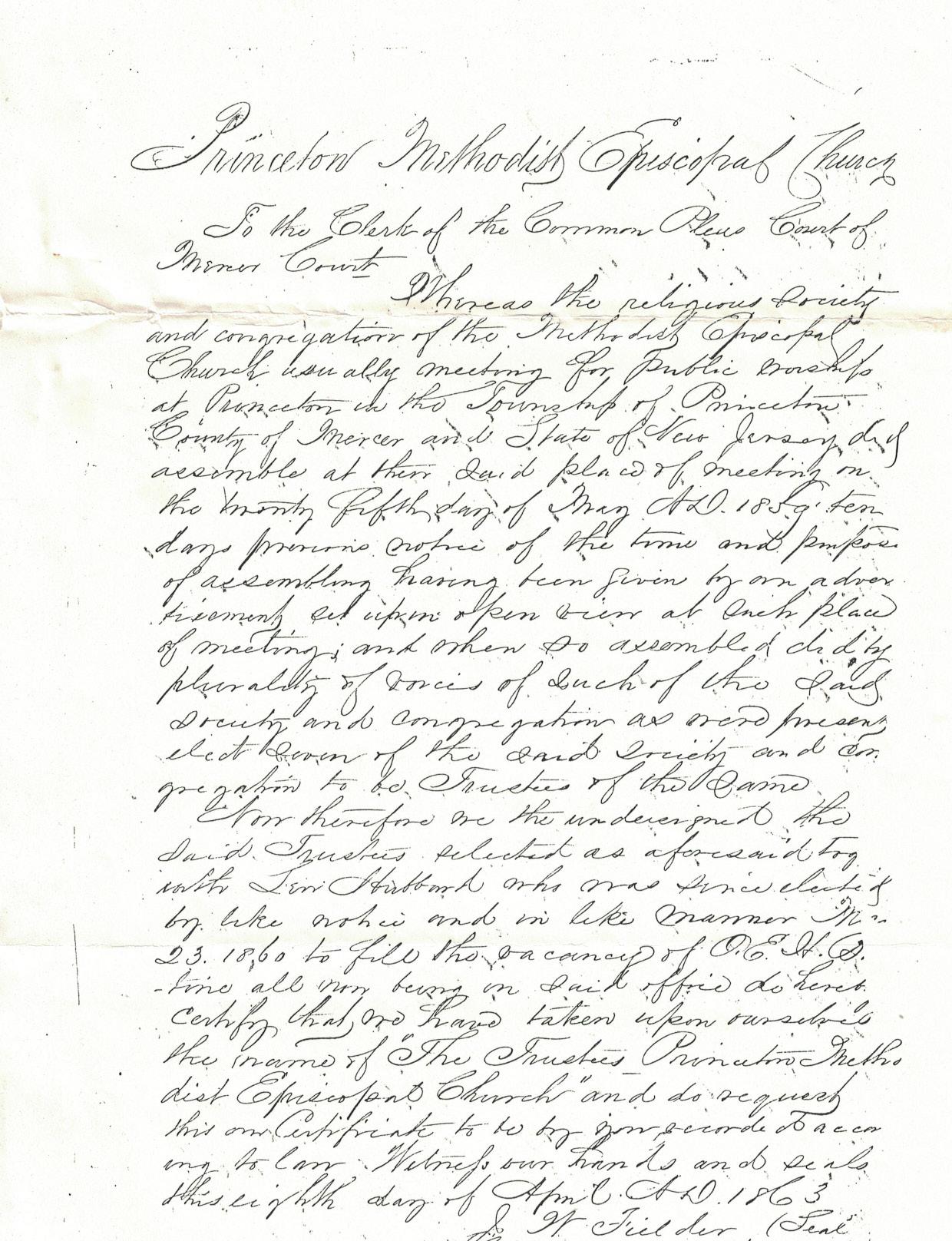
Now therefore we the undersigned, the said Trustees selected as aforesaid together with Levi Hubbard who was since elected by like notice and in like manner May 23, 1860 to fill the vacancy of O.E.H. ____ all men being in said office do hereby certify that and have taken upon ourselves the name of “The Trustees Princeton Methodist Episcopal Church” and do request this our Certificate to be by …………………….. our hands and seals this eighth day of April A.D. 1863.
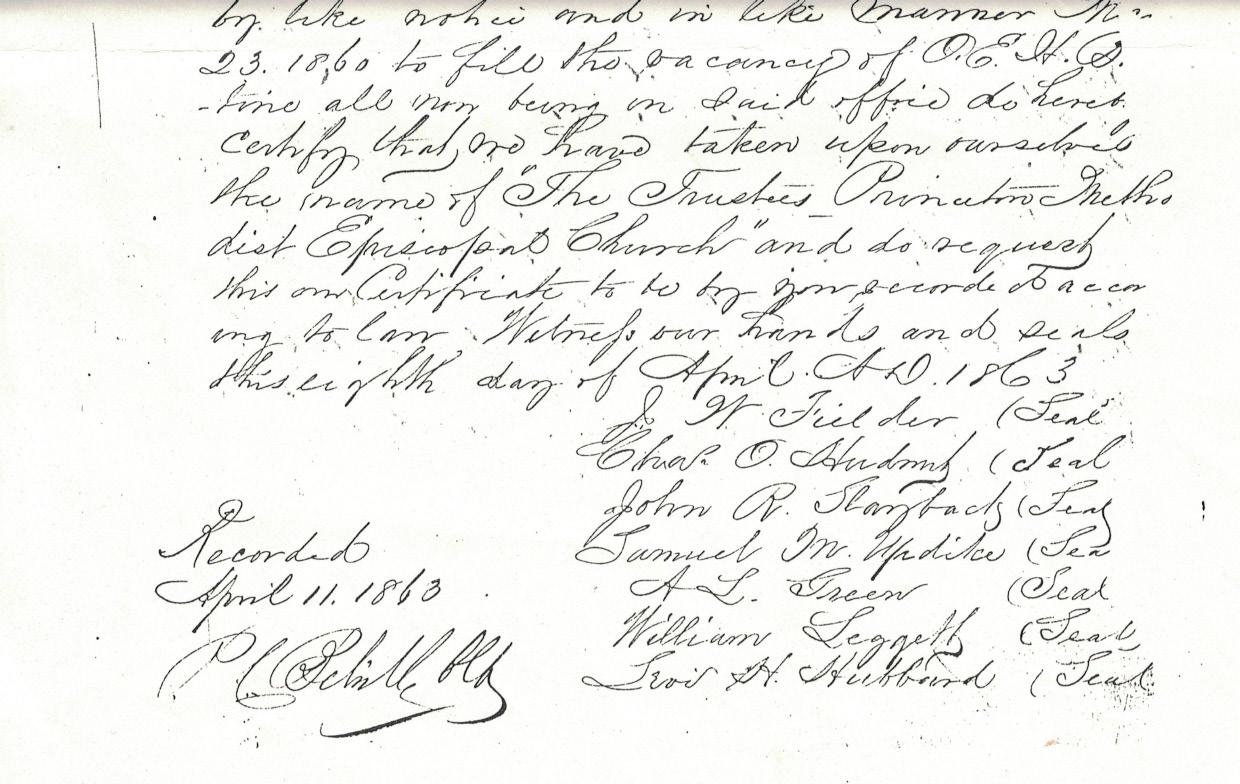
J.W. Fielder
John R. Slayback
Samuel M. Updike
A.L. Green
William Leggeth
Levi H. Hubbard
KINGSTON UMC CORNER
Welcome Statement Reaffirmation
Last month, the Kingston UMC church family took time during Sunday worship to reaffirm their church welcome statement and mark the occasion with an inclusive (and colorful!) addition to their church signboard. The Kingston UMC welcome statement reads:
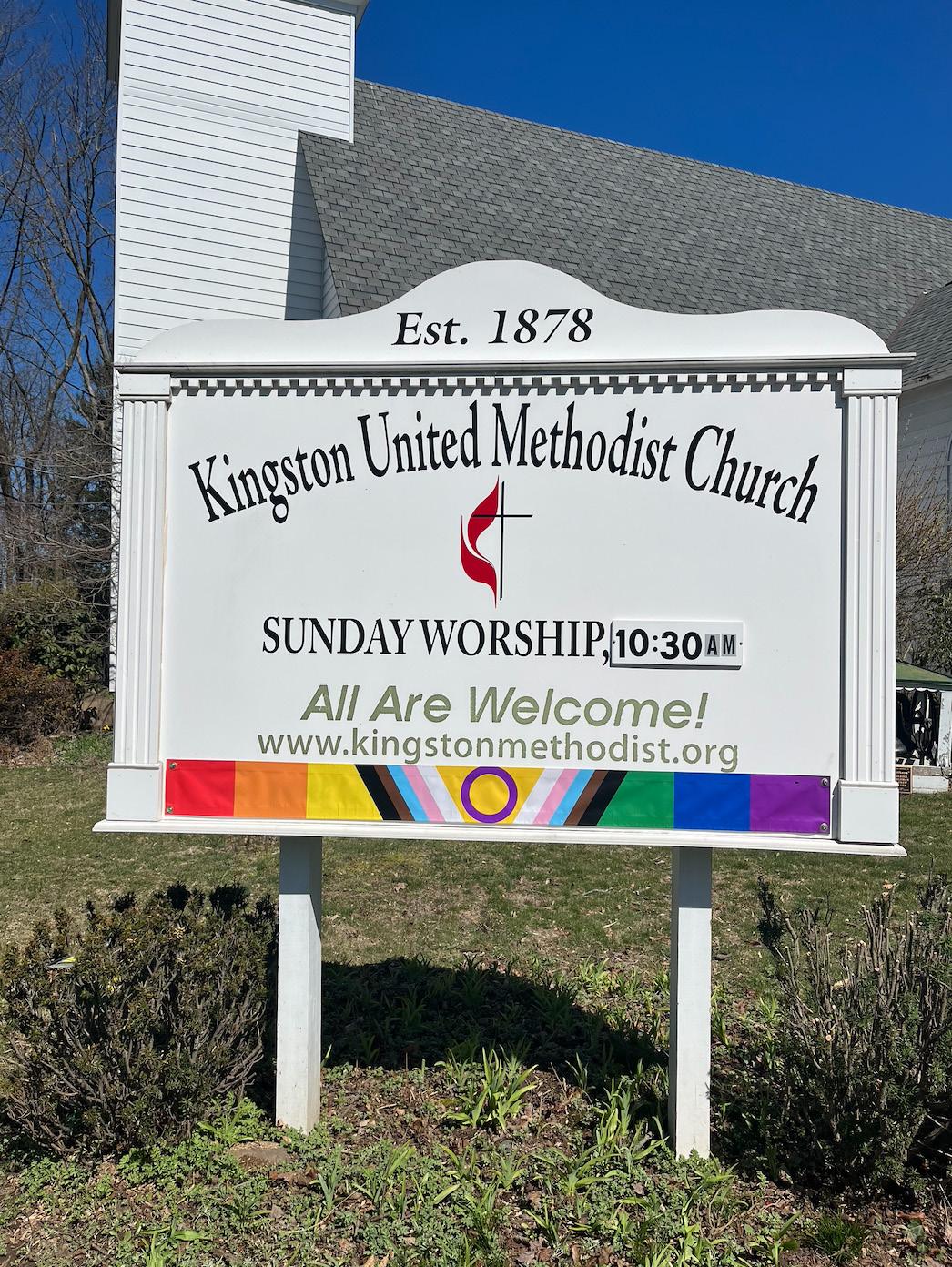
“Kingston UMC is a community of people who come from many places, embody different backgrounds, hold varying opinions, and find ourselves on unique spiritual journeys.
We believe that all people are made in the image of God, and we follow the way of Jesus Christ, who broke down boundaries and proclaimed the good news that all are invited and empowered by the Holy Spirit to enjoy God’s love and join in the pursuit of justice.
We join our voices with the welcome of God, whose love is inclusive and welcoming to all.
Welcome to those of all abilities, those with mental or physical illness, those who struggle with and are impacted by addiction.
Welcome to those who have been hurt by the church or healed through the church, those who question and those who believe.
Welcome to all those whose identities are complex and who long for their stories of joy, sadness, fear, grief, gratitude, doubt, faith, or peace to be heard and held.
Welcome to neighbors, strangers, and friends; welcome to siblings, to single people and partnered people, to children and parents, to married people and divorced people; welcome to seniors and babies and those of every age in between.
Welcome to people of all countries, all colors, all cultures, and all classes.
Welcome to people of all genders, all gender expressions, all sexual orientations and identities.
You are welcome to join with us, an imperfect people who rely on God’s grace, as we work to create a space where everyone who enters in knows: You are safe here. You are worthy of love and belonging. And you are invited into full participation in our community of faith.”
In addition to this welcome statement reaffirmation, KUMC also recently voted to adopt the vision, mission, and values of Princeton UMC. This is a huge step forward in the development of our Central District Multi-Site Ministry.
OUR MULTI-SITE MISSION STATEMENT:
We are a DIVERSE faith community, engaged in ENLIVENING SPIRITUALLY THIRSTY PEOPLE to JOYFULLY RESPOND to God’s love and GROW as disciples of Christ, so that together we may EXPERIENCE THE FULLNESS OF LIFE.
 by John Newton
by John Newton

 -Raphael Aryeetey
-Raphael Aryeetey

 Rev. Skitch Matson
Rev. Skitch Matson


 Kate Lasko
Kate Lasko
 Iona Harding, Chair of Leadership Board and Multi-Site Ministry Design Team
Iona Harding, Chair of Leadership Board and Multi-Site Ministry Design Team























